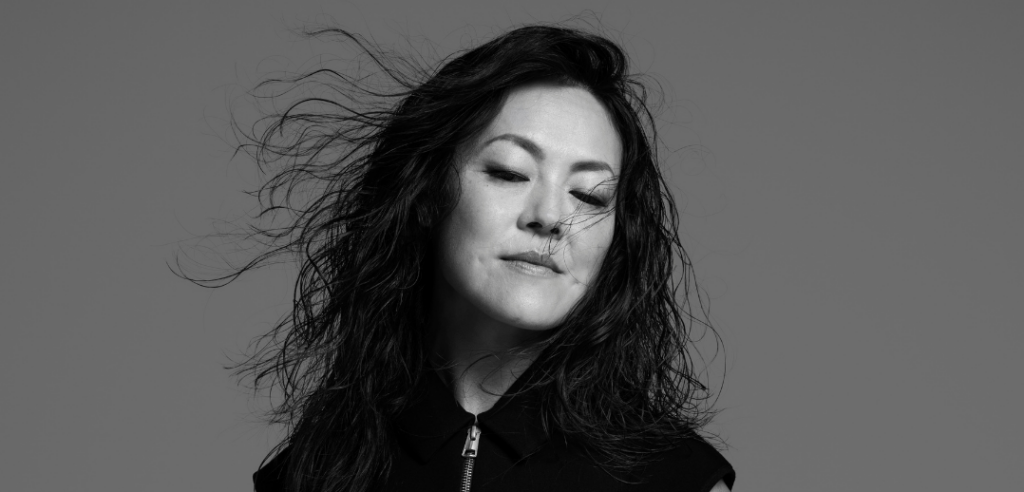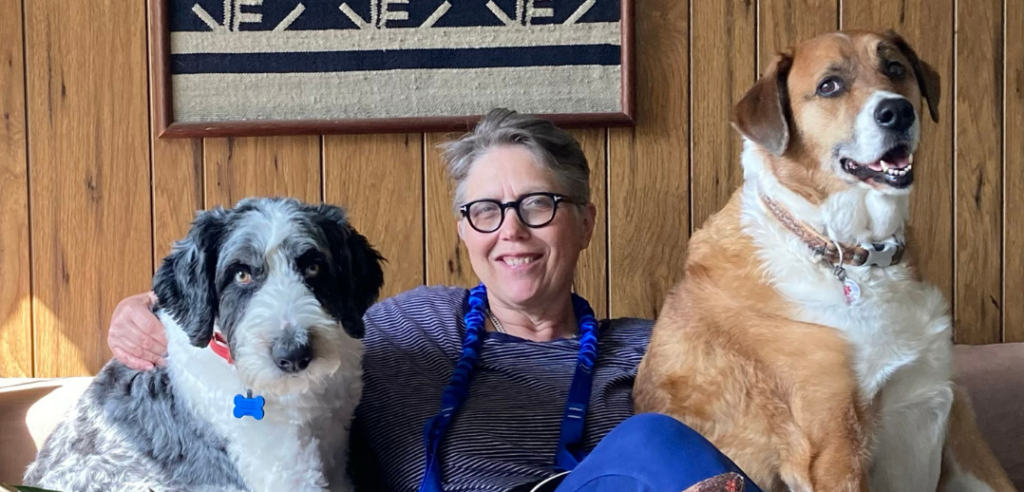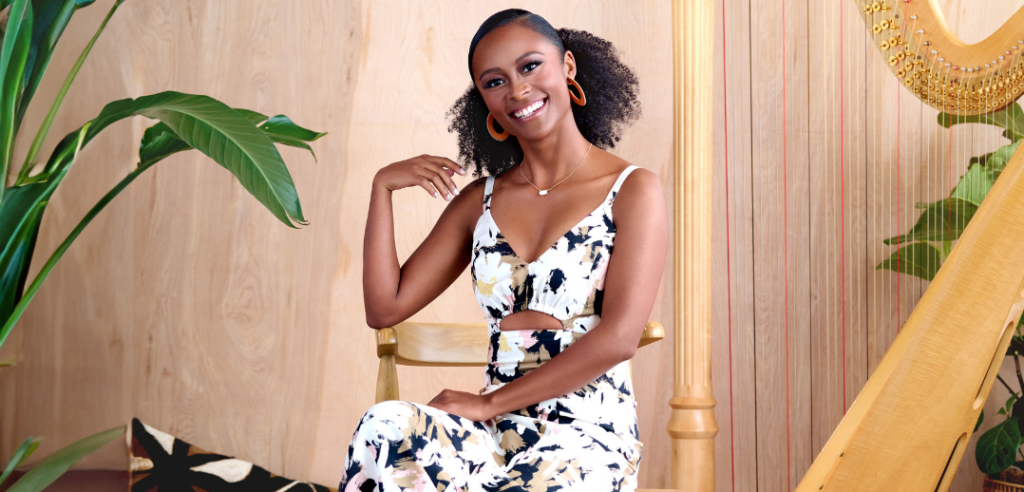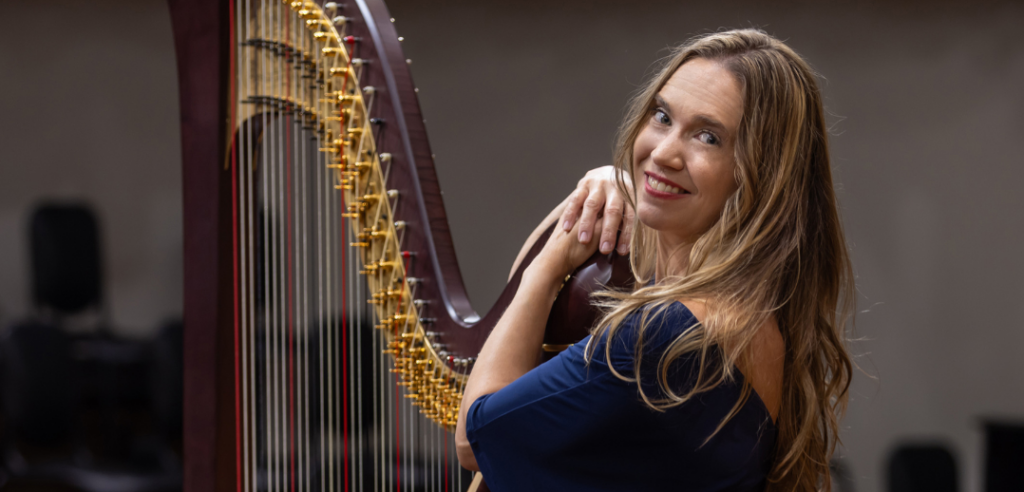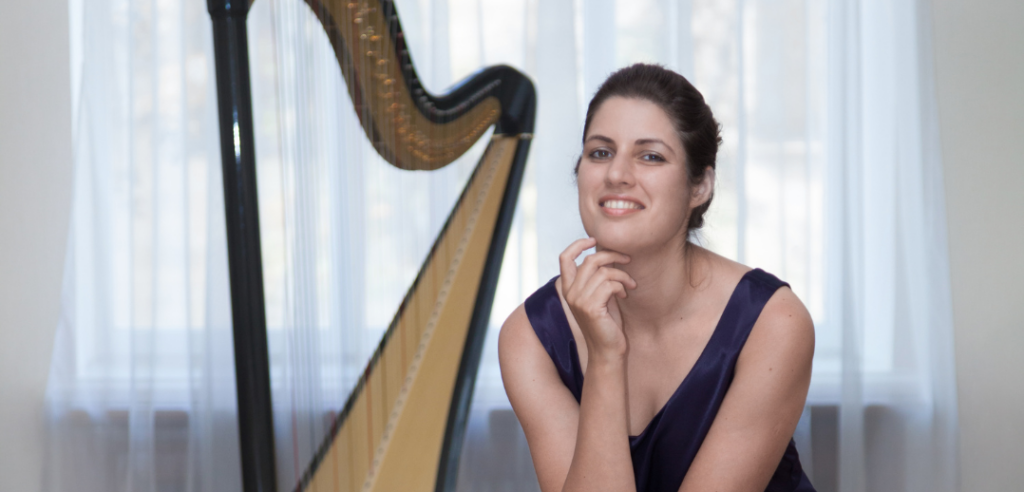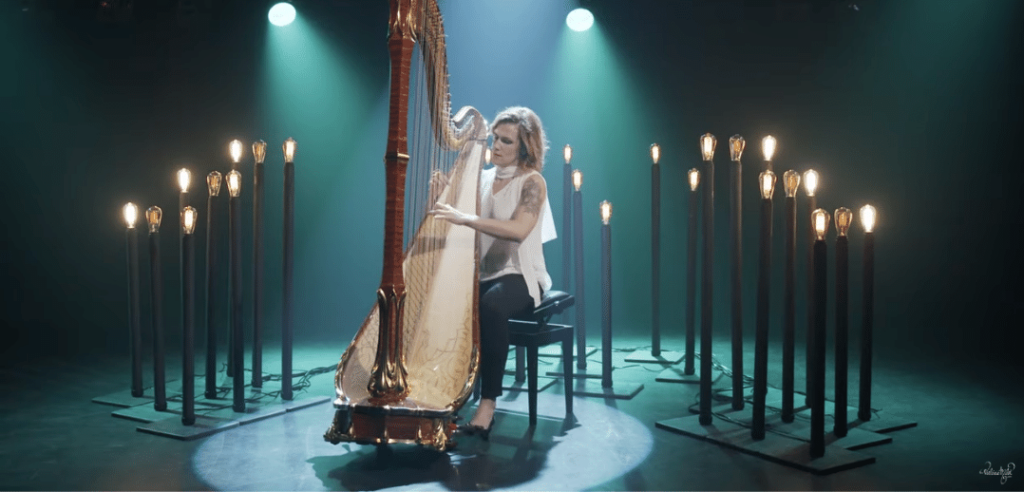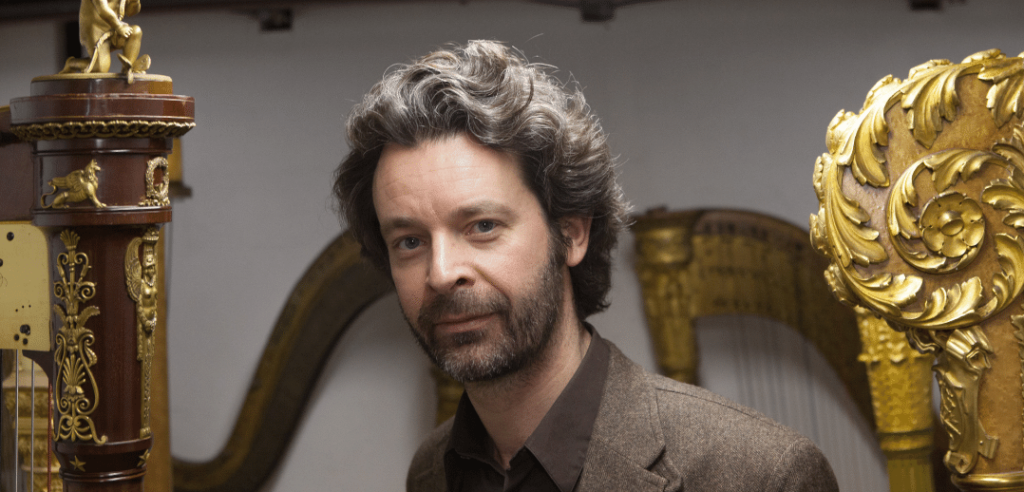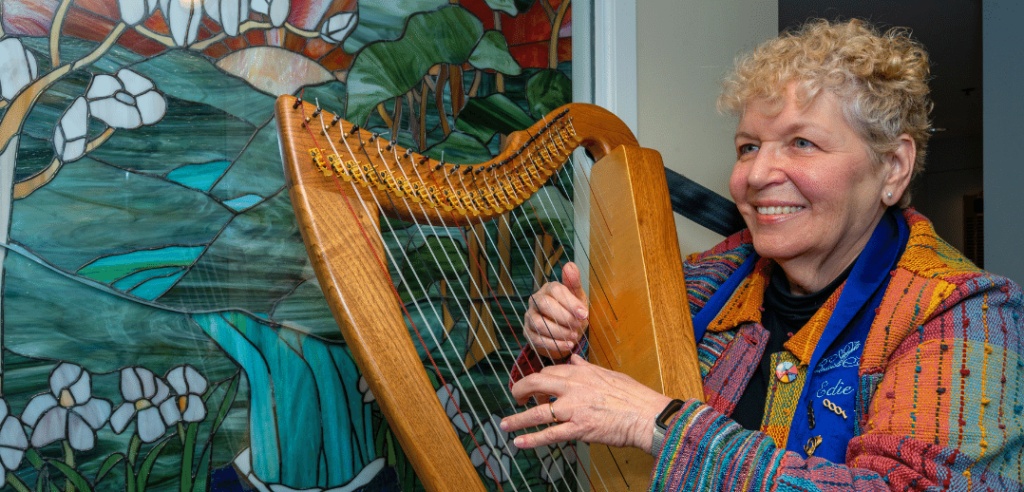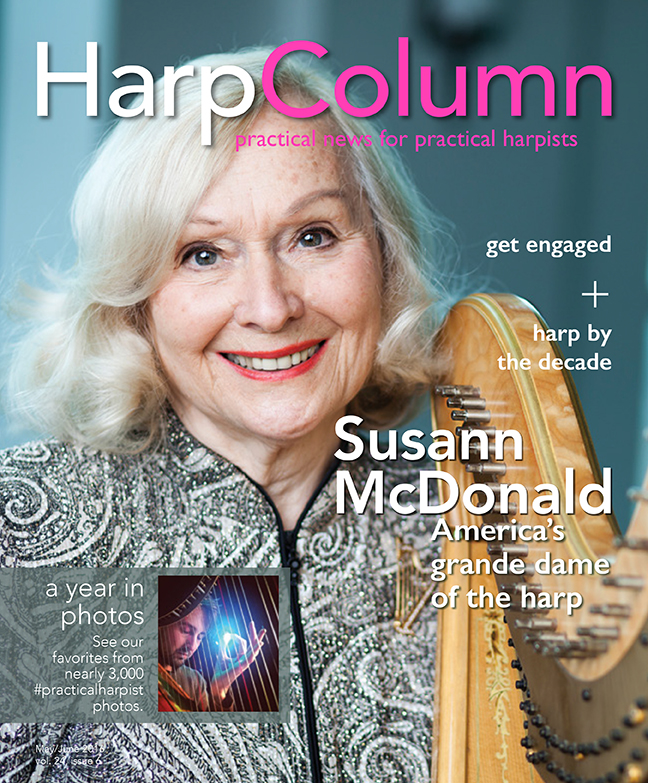—by Natalie Hoffmann
Susann McDonald is enjoying a landmark year. This summer the USA International Harp Competition will hold its 10th contest. Since McDonald started it in 1989, the competition has grown into one of the world’s most prestigious for harpists. Shortly after that, the American Harp Society will honor McDonald with a tribute concert at its biennial conference in Atlanta. And last May, McDonald celebrated her 80th birthday, surrounded by her friends, colleagues, and students.
McDonald’s influence on the harp community in the United States in the last 60 years is unmatched. As Distinguished Professor of Harp at Indiana University (IU), McDonald heads the largest harp department in the country, drawing top students from around the world. Her USA Competition has launched the careers of some of the most talented harpists performing today. And her compositions and teaching method continue to guide each new generation of harpists. We asked McDonald’s current teaching assistant at IU, Natalie Hoffman, to sit down with her mentor to talk about her remarkable career.
Harp Column: This year marks the tenth anniversary of the USA International Harp Competition (USAIHC). You had an impressive 68 applicants, possibly the largest amount for any harp competition. What do you think is the big draw for the USA competition?
Susann McDonald: Well, I have thought about that a lot. I think it’s the repertoire. We usually try to have repertoire that harpists can really use in their performing careers and recitals, and also important repertoire that they should know. I think the Ginastera harp concerto was a big draw this competition. People really want to learn that concerto. We always try to have some of Renié’s music [Légende in this year’s competition]. We also try to include different schools of harp playing in the repertoire. So wherever one studied, whether in Asia or Europe or here, there will be pieces that they will know and might want to play. I like to be as fair as possible on repertoire—nothing extraordinary that requires you to jump through hoops. Not that it is easy by any means, but it’s challenging and hopefully develops their musicianship and their technique.
HC: I like that in the third stage, the competitors can choose their own repertoire because it shows so much insight into the artist.
SM: It is so important to allow a free choice, because otherwise, it seems unfair that they can’t use anything. This stage shows their personality and their musical taste.
HC: Twenty-seven years after the first USAIHC, how do you feel the competition compares to the vision you had when you started it a quarter century ago?
SM: That’s a good question. I feel like we have a lot more support coming from a good board of directors—people who have really devoted themselves to the harp competition, both financially and time-wise. We have a wonderful grant writer, Janet Smith, and that has really helped us tremendously. We have received major grants. That is one of the biggest things. And of course the constant support of Lyon & Healy.
HC: What was the impetus for starting the USA competition?
SM: That’s a good question and I can easily answer it. I had been invited to be on the jury of so many other competitions—in France, in Germany, in Israel—really all over where there were harp competitions. I kept thinking, We have such wonderful facilities at Indiana. We have the halls, the harps, and the proximity to Chicago for Lyon & Healy to get there. Particularly after being in Israel, I thought, My gosh, they have to ship harps over there? We have all the facilities you could imagine and dormitories. I think we used the dorms more at the beginning, but I also thought we were a small enough community that we could provide host families. And that would be a great thing internationally. We were coming out of the Cold War. I mean, it was over by then, but I think people were still very much wanting to experience other countries. Our first jury, too, was absolutely amazing—all the great names in the harp world—they were all here for that first competition.
As far as I am concerned, our goal is to promote the harp, but also to give young artists, harpists, a boost up to make a career. That is where I feel we really have felt at home because most of our first-prize winners have had and are having incredible careers. That is one major goal of the harp competition that has been realized. It’s hard to emerge in the world as an artist, and this really boosts people. For example, when Jana Bouskova won first prize, she immediately got management in Germany and became principal harpist with the Czech Philharmonic. The Russian harpist Maria Krushevskaya immediately auditioned and won the Bolshoi Ballet in Moscow. Practically the next week after he won, Emmanuel Ceysson auditioned for the Paris Opera and won one of those positions. Xavier de Maistre too, became quickly recognized in the world. These are some of the most important positions in these countries! So people really have just had great careers.
HC: How many applications did you have for the first competition?
SM: You know, I don’t remember. I remember there were a lot, perhaps in the 30s.
HC: So it seems like it was a success from the beginning.
SM: Oh, very much so! I think also we had tried to eliminate politics from the voting procedure. I remember the first competition, to be so sure of that, we hired an accounting firm! These guys came in with their briefcases, their computers, and set up to oversee the voting. We got away from that because really, it was not necessary.
HC: [Laughs] You were just being very safe from the start! That’s a funny story. Okay, so what is your future vision with the USA competition?
SM: Well, I can hardly picture us doing anything better, truthfully, but [I see] the competition continuing. I do think it is kind of interesting that for the first time in the history of both the [International Harp Contest in] Israel and USA competitions, we have invited the Israel first-prize winner to play at our competition and they have invited our first-prize winner to go to Israel. Unfortunately, this is not all set in stone yet, but it was discussed with their artistic director, and we have implemented it already by bringing the first-prize winner. She is definitely contracted to play here; we have her program already, so it’s going to happen!
HC: I’m sure you have answered this question many times, but for those who haven’t heard your story, can you tell us how you began the harp?
SM: Well, that is an interesting story because I tell people I play the harp because of my grandfather. My grandfather was a great philanthropist and also a very strong Christian. He believed in taking ministry to prisons; he would lead hymn singing in the prisons. My grandfather would take a harpist into prison with him because he couldn’t carry a piano, so he would take in a harp instead. My mother would see this harp loaded on Sundays, and that’s why she started playing the harp. She wasn’t too serious about it, though, I get the feeling from everyone. So when she went to college she didn’t continue with the harp, but when she married my father, she said, “Oh, if we have a daughter, we must have her play the harp.” So you see now, it all came from my grandfather.
HC: At what age did you begin playing the harp?
SM: I think around 6 when I first started. We were living in Rock Island, Ill.
HC: At what point did you know that harp would be your life, and that teaching would become your passion?
SM: Well, from the time I was a junior in high school, I was teaching six students in Rock Island—little ones for the most part. I would come home after school and teach. It was such a natural part of my playing. Then, of course, I had wonderful role models in my teachers. First was Mrs. Petterson, who was the local teacher in Bouldering, Ill. She came to the house for lessons. Also, I was blessed, I think, to have teachers who, each one, said to my parents, “I have taught Susann everything I know.” In her case, she said, “I think we should take her to Chicago to study.” And that must have been when I was 13. So she did that dearly. She would ride in the train with me from Rock Island to Chicago, and I went to the Lyon & Healy building there and studied with their staff harpist, who was Marie Ludwig. She had been playing with Toscanini and with Salzedo in the Metropolitan Opera. They were both there at the same time. She married a clarinetist with the Chicago Symphony. She was a big German lady—wonderful, so sweet to me—and she was Mildred Dilling’s first teacher even though they were only four years apart. So Mildred studied with Marie Ludwig too before she went to study with Mme. Renié. Let’s see, so Marie Ludwig arranged for me to have lessons with Mildred Dilling between my junior and senior years of high school, and Mildred said right away, “Oh! She must study with my teacher, Mme. Renié!” It was very interesting that these teachers kept passing me along. She arranged a chaperone for me, and off I went to Paris for a summer. Certainly Mme. Renié was an enormous influence.
At that point, I really didn’t want to study with anyone else. I came home and my parents trotted me around to visit different schools in different parts of the country, but all I could think of was going back to study with her. So when I graduated from high school, I went back and studied with her privately for the first year, and also solfège at the École Normale, and then Mme. Renié said, “If you entered the Paris Conservatory, I think you would win the first prize (Premiere Prix).” So then I came home after that first year in France, and I told my parents I wanted to go back! They thought it would just be a one-year thing, and, oh boy, they were not happy! Really, my father did not give me permission to go back. I went by ship each time, you know, those days you traveled by ship! So finally, I went back to the Paris Conservatory. Mme. Renié had Lily Laskine come to hear me play, and they accepted me into her class.
HC: Did Renié and Laskine encourage you to continue teaching while studying at the Paris Conservatory?
SM: Not so much, I would say. That wasn’t your focus—I mean, I was a performer. In those days, that’s all I wanted to do, to play. So I did win the first prize there, and Mme. Renié had presented me on a couple recitals in her home while I was there. But when I won that first prize, I was the first American to do so. It made quite an impact in the press back in the United States. While I was still in Paris, the first-prize winners were presented in the Palais de Chaillot. It’s quite a deal in France. It is one of the biggest palaces there. In those days it was not televised, but it was recorded live. So the press covered it a lot too. That was sort of my debut there. But then I came home, and the Chicago Tribune had written quite extensively about my winning the prize. The guy that had organized that contacted me and asked if they could present me on Soldier’s Field before 60,000 people. They put a stage right out in the middle of that field and they put the harp there. It was for the Chicagoland Music Festival, which was organized and sponsored by the Chicago Tribune. We were all brought out in convertibles, circled around, then got out and went to the stage and played. Because of that appearance, I was on the Dave Garroway Show, The Today Show in New York, and some other appearances like that too. So my career kind of got launched that way.
At that point teaching was not on my horizon. I was mainly doing recitals. I had a manager. I have had several managers in my life, but one in New York would book me tours. I did four recitals in Carnegie Hall in New York. Three different recital programs in one week. It had never been done before, but that particular manager said, “You must do something to attract attention,” so that was it! Every other day—Monday, Wednesday, and Friday—I played a different program in Carnegie Hall. And here the whole purpose was to gain attention, but the newspapers went on strike that week! Can you imagine? However, it was covered by Musical America and those magazines. But imagine—Carlos Salzedo, Marcel Grandjany, Mildred Dilling—they all came to those recitals! It was quite a time.
HC: Was there a point at which you decided to back off of the performing side and focus on other aspects of your harp career, like teaching, recording, and composing?
SM: Well it really goes back to Sanibel Island. My parents and I took a vacation on Sanibel Island. My mother loved it there—we picked up shells, things like that. While we were there, the organist in the church that we went to took a shine to us, and we ate some meals with her. Turned out, her son was the dean of fine arts at the University of Arizona. She knew I had left New York and was kind of looking for what to do with my life exactly. After that trip to Florida, I was going to visit my brother and his family in California, and I took the train there. This lady knew of my plans, and so she said, “Oh! You must stop in Tucson. I have people there to meet you, take you around and introduce you.” She knew they had a harp, but no harpist. This lady set the whole thing up. I got off the train in Tucson and her family met me. They introduced me to the director of the school of music there, and he interviewed me and offered me a job! But I didn’t move there. I was on my way to California to visit, and because all of my mother’s family also lived in that area, I planned that is where I would settle. That is where I really wanted to live. So there I was with a job in Tucson, but living in California. I was so thrilled to have a teaching job because I never had a bachelor’s degree, much less a doctorate. I just went to the Paris Conservatory, although I had taken a lot of courses. I took some correspondence courses in harmony and theory and I did French literature at Columbia University. I mean I did do things in those years, but, for academia, it was not an ideal background. So I was thrilled to get a teaching position at a university.
Then things kind of escalated a lot from there in California. One of my close friends was a professor at California State in Los Angeles. Her daughter studied harp with me, and her mother kept thinking, “Well gosh, we don’t have a harp teacher at Cal State.” At that time, all of the California schools had harp teachers, so there was really no place for me to even apply. But this school didn’t have any harp. So I started teaching there, and right away I had a class of five or six harpists.
Then at USC (University of Southern California) at that time, Carol Baum was the teacher, and she had one wonderful student, who was Erica Goodman, who now lives in Canada. She graduated and left, and Carol felt so badly that she resigned from USC. By that time, also, I was friends with two sisters who were also good friends with this other professor. They were the teachers of violin and cello at USC. We started playing concerts together. So of course, when the position opened up, they said, “Oh! You must come too.” So very quickly I was hired by USC.
I was still touring at that time. One of my managers, the House of Bliss was the name of it, booked me mainly on college campuses. Like one year, I played at all the colleges in Arkansas. So I did quite a bit of touring, and because of that, wherever I was, it seemed immediately there were students that wanted to work with me. I started recording too. Those days in California, I had a new album every year, really. I had three different record producers that were wanting me to record with them. I loved that, and I loved recording. That was really what I loved to do. But then, I was teaching at the University of Arizona, commuting there, teaching class at Cal State Los Angeles, and then teaching at USC. All at the same time! So I was really busy! [Laughs] I built classes wherever I was. Gosh, in the heyday when I was there, there were 13 harpists at Tucson, I would say eight or 10 at Cal State, and I think also around 12 or 13 at USC.
While all of that was going on, one day the phone rang and it was the president at Juilliard. He said “Mr. Grandjany has passed away and we know that you are in the same school; you both studied with the same teacher.” What had really tipped it I guess was that I was the only harpist in Bakers Music Biographical Dictionary! I was not aware, but I later found out that that was a dominant thing as to why they chose me. So I commuted to New York for a year, and I was not very happy doing that. I mean, you could not imagine just how busy I was. I didn’t go but once every three weeks to New York. I would take the red eye, get off there in the morning, teach two or three days of double lessons, and then fly back. They only had eight students, so one could do that. I thought, “I think this is enough. I am going to resign.” So that last trip I went to the dean of the students and said, “I think the traveling is too much for me.” He said, “The president wants to speak with you personally.” So the dean took me in a cab to his Park Avenue apartment. I sat down and, after greeting me, he said, “So, now, tell me what you want. We don’t want to lose you, tell me what you want.” At that point, I actually was seeing an [financial] advisor in California because I was working so hard and really not making much money. The advisor said, “You go to each of those schools and you tell them ‘Double my salary or I am leaving.’” And he really was a stern guy. So that is what I said in New York. I also did it in Arizona, I also did it at USC. But the problem was they all did that—they all doubled my salary! And, in the case of New York, I said, “I don’t like staying in a hotel.” So I got a lovely apartment, just a studio apartment, but then I had a place to go home. I kept one of my harps back there, and it was right near Juilliard so I could often teach at home too. But then because Tucson and USC doubled my salary, I couldn’t walk away then! So it made it even worse! But honey, those were really amazing years and I look back on it and I don’t quite understand how I even did that.
At the same time, Columbia Artists called me and that’s when they signed me and I started doing tours for Columbia Artists—one for the West coast, one for the East coast. So that too. I mean I was home so little. I had a secretary. I had so many people working for me it was unbelievable.
HC: Okay, so then how did you arrive at Indiana University (IU)?
SM: While I was in New York, I met a lot of musicians. The apartment building that I lived in had a lot of conductors, singers, pianists, and what not. I kept hearing about Indiana University. I was so surprised because very famous and prominent pianists and singers were going there and I didn’t understand why. Then I got a letter from Dean Christ, contacting me searching for a harp professor. I guess the previous harp teacher here had resigned and they did a big search. I didn’t think anything of it. I threw it away. I wasn’t interested; I didn’t think I was! But they kept after me and finally I thought, Well, why don’t I go and look. So on one trip from California, I stopped off and they met me, drove me, and brought me down. Charles Webb paraded me around the campus and I was very, very impressed. I had a cousin whose husband was chair of the English department at IU. He had passed away, but my cousin was still here and she of course very much encouraged me. At that time too, I found out exactly what the financial situation was here: the pension possibilities, everything was so different than any of the other schools. That swayed me a lot. At that point I made a decision—I resigned all three schools in the West. When I did that I also realized that everybody knew of Indiana University—very, very famous school! Also, I had in my mind that it was closer to Juilliard. It was a much shorter commute that made much more sense to me and Charles Webb was fine with me staying with Juilliard. But as I did that, I got less and less happy about still continuing to commute. I was probably going every two weeks to New York. So I decided to gamble and leave Juilliard and stay here in Bloomington, to make this my home and settle down.
HC: As a young harpist, say in your early 20s, what did you think your future harp career would look like? Did you envision that you would not only perform, but you would teach, compose, arrange, commission, and create?
SM: I think mainly [I thought I would just be] performing. That was what I was doing. I loved to play; loved to record. However, you could see sort of scattered out in my early years, I was teaching. Loved to do it, but I was awfully busy. Even in the midst of all of that, my secretary would book one day a month and students would come from all over Europe or from the East Coast just for that one day I would teach. So it was certainly still part of my life. And then sometimes I would compose some pieces for my students. That started some of the Graded Recital Series pieces, I wrote those for young students. I thought there wasn’t that much music for beginning harpists that really was harpistic.
HC: Who influenced you the most in your teaching style?
SM: Oh, Mme. Renié without a doubt. I think I was her last major student. She wasn’t teaching so much, so I would come for an hour lesson and she would keep me three hours, talking to me a lot about her life and her faith. She was an ardent Catholic—went to mass every morning at 6 a.m. This is probably also where I got this business of writing devotions. She would come home, sit at her desk, do the Bible verse, probably from the church that morning, and write. She had these little notebooks filled with her devotions and many of them now are in the American Harp Society archives at Brigham Young University. After Mme. Renié died, we were able to arrange for her goddaughter to take them there. They are in a vault, actually, a private room that you go in and you can’t take them out of that room. She wrote such beautiful thoughts, like before a recital. It’s so interesting to me that she suffered just like we all do! That was a big influence certainly all my life.
HC: Did you make any changes in your teaching from the way you were taught?
SM: Yes, probably because in teaching in college situations, the demands were a little different. I mean, you are working with many different students, and most of them have to do degree recitals, so it dictates some of the repertoire. I also had a lot of students who were wanting to do competitions right away, so you are preparing repertoire for that. I think also it was such a different stage of my life because she was older when I went to her: 79, 80, and 81 when she died. I was much younger and working with younger students. It was just very, very different in that way.
HC: Currently in your harp studio, you have students traveling all the way to Bloomington from China, Korea, Mexico, Cuba, and Turkey just to study with you. Why do you think the best harpists in the world are drawn to study with you?
SM: Well you know, I don’t think it is just due to me. I also think it is Indiana University that offers such a fine program. The fact that we have five symphony orchestras, three concert bands—that’s a lot of opportunities. I think really the students have great opportunities to meet each other, meet the best harpists in the world, see what is going on in the world, and make friends with them! You can almost go to any city in the world and one of our IU students would be there. That is something that has meant a lot to me: fostering friendships among my students. I want them to be friends. Some of my best friends are colleagues of mine, so I believe in that so much! It is such enrichment to students to meet people from other countries and see different things.
HC: What makes a successful lesson in your eyes?
SM: Well, I think a number of factors. I would say, certainly, I always hope I leave a student feeling encouraged. I think one of the most important things a teacher can do is to encourage. Maybe lift their sights a little higher to hopefully inspire them to do a little bit more, get better, develop better tone quality and musicianship. So a composite of all those things would go into what is a successful lesson. It isn’t always that the student leaves happy after every lesson. Sometimes it is not possible because there may be difficult circumstances in their lives and that affects their music a lot. So I try to be sensitive to what is going on in their lives. Particularly their lives are so different from my life, say when I was studying with Mme. Renié. Basically that was all that I did when I was at the Paris Conservatory, just practice. I was living in boarding houses; I was rather lonely. But I lived for my lessons! I really did. I remember getting off that subway, walking down the street to number 55, opening this great big door onto this courtyard and in I would go! Magical times…
I don’t know if I told this story yet, but I will never forget it! Before the Premiere Prix, I had a lesson. Of course, I was prepared to play the whole piece. Mme. Renié spent almost the entire lesson on the first page, which was just glissandos! I was just heartbroken. I mean I really needed to play the piece. I went home and cried. Anyway, the jury told me from the moment those first glissandos started, I had won! [Laughs] Isn’t that interesting? It was just amazing to me that that would have had such an influence. But it was a little difficult for me too because I would play for Lily Laskine just once a week. She had younger, less advanced students, so she said to just come Fridays to play for her. We would be studying the same music, and she would see a fingering that Mme. Renié had put on and say, “No, no, no. I do it like this.” Then I would go back to Mme. Renié and she would say, “Oh no, no, no!” I got along fine going between them like that, but at the competition, you know, they were both there! I had to choose! But mostly it went well. They were both very sweet people.
HC: Overall, what is the single most important teaching point you feel needs to be conveyed to your students?
SM: I would say it is to do your best and to realize that you cannot compare yourself to somebody else. I think that people often do, particularly in a big class when you hear very different ways of playing and what not. I think to emphasize the individuality of each student and to help them realize that they just need to be the best of themselves and their fingers, minds, and hearts. And to appreciate the good points of each student. Everyone has some, and I try to accentuate those.
HC: Right! Sometimes people think more on the competitive side of things, and I find it better to look more positively. If someone is interpreting a piece differently from how you would, you can view their interpretation as another option. And if you like it, then implement it!
SM: Yes, right! I think that it is a huge advantage of having such a large class. Really, it is a laboratory in itself to realize the different approaches, different everything, between this many different people that you hear so much! So I think it is so broadening. I mean, it is one of the huge advantages of the IU class. You come out of here knowing what is acceptable world-wide, and what maybe isn’t.
HC: You’ve taught multiple generations of harpists—how have harp students changed since you started teaching, and how are they the same as they’ve always been?
SM: Well you know, that’s where Indiana is different. We all have classes, I mean it’s not just a single focus in harp playing, while Juilliard is pretty much that attitude. I think the thing that has changed the most is that people are busier. Because of the internet—all that stuff. I know my life has changed so much because of just constant email. I wish I didn’t have to do it, but I do. And that is what really cuts into my practice time because it is just a disaster that way. I am sure it is the same for all of the students. It is the same drag on your time when you are totally free to just go practice, practice, practice and instead you have to go email, email, email. Not to mention Facebook and that stuff!
HC: The job market is tough for any student seeking employment in today’s economy. What is your advice to your harp students who want to make a living in the music world?
SM: I have a lot to say about that because I believe that one should go where there is a need. I feel that so often people will go where they want to go. But there is no need for a harpist if there are lots of harpists there. Right now I would be pushing Costa Rica, that area. For some reason, they don’t seem to have harps or harp teachers! Gosh, I wanted to live in California but all the California colleges were filled, and that is so often the case, that the jobs are taken. Then the other thing is go there and help people that are so busy. Offer to sub for them, offer to help them, and often that will lead to more work. The main thing is go where there is a need. Don’t go where there are just harpists galore! None of them will get jobs.
HC: That’s great advice. At age 80, you have had a long and illustrious career. I have seen your incredible work ethic first hand. With so many great accomplishments under your belt, what motivates you to keep pushing yourself?
SM: Well gosh, I don’t know. It’s hard to say. I really have to say I do love the students. I do love being with them, so its very happy work, for the most part. I mean there are things that can go wrong, and particularly it’s hard when I see students suffering. I hate that and I hate to see them mistreated, too. But I would say it’s the love for my students that keeps me motivated to keep teaching, as long as I feel like I can and am able to.
HC: As the Distinguished Professor of Harp at Indiana University, with one of the largest harp departments in the world (currently 20 harp majors), the Founder and Artistic Director of the USA International Harp Competition and many more responsibilities I am sure, how do you manage it all?
SM: Well, I don’t know. I think I had mentioned before the interview that I start the day with devotions and prayers. I feel like I don’t want to go out the door until I have prayed for the day. I do try to be organized, as much as I can. I am not the most organized person, but I try for everyone’s sake to make it all go smoothly. I think to be reliable—you can count on me being there. It is important for the teacher to do that for their students. I see a lot of eccentric things going on around me, but I think I should try to be dependable.
HC: As your teaching assistant, I have had to reschedule lessons at the last minute to not have any gaps in your schedule. You also have a driver take you to and from school everyday to avoid the hassle of parking. It is clear to me that you do not like to waste any time! Can you speak about how you manage your time?
SM: Well my mornings are always reserved for practice. But now, unfortunately, they are reserved for emails, and necessary phone calls, and practice. And preparing for the teaching day! I mean, I do try to look through what the students are going to do today. All of that takes a lot of time. I don’t usually have much time. What has fallen by the way side that I do regret very badly is that I am not exercising very much any more. I used to walk a half an hour every morning, religiously. I am not doing it, and I am ashamed of myself. But really I want to. I think when the weather improves, I will move more quickly. Right now I just don’t have the heart for it. But that is my regret and what I want to change.
HC: What single accomplishment, harp-related or not, are you most proud of? Are there any regrets?
SM: Well, I know I was really thrilled to get Harp for Today, the harp method book, done. Linda (Wood Rollo) and I have done a lot of work on children’s things. That is important too, but I have always wanted to write an adult method book. So I am really thrilled to have gotten that done! I am proud of it, and I felt it was a good time to do it too. No regrets. I really don’t! I live a happy life and mostly have thanksgiving, not regrets.
HC: People want to know more about you—what would you like to tell them? Tell us some things that would surprise us!
SM: Well, it does seem to surprise a lot of people that I love to play golf! I really do love to play and sometimes do pretty well. Again, I don’t have much time to practice, and with golf, you really have to practice! But you know, I love to play golf. If I had more time, maybe my only regret is that I would love to spend more time gardening because I also love to be out in the yard. I love flowers. And then you know I love my doggie, Baby. All sorts of great joy for me.
HC: Right! What is your best score?
SM: I got a 39 for nine holes once. It’s better than what I am doing now! My typical score now is like 54. So 39 was phenomenal for me.
HC: There is going to be a tribute concert for you at the 2016 AHS National Conference in Atlanta, as well as a celebration gala for you at the 2016 USA International Harp Competition. The harp world is clearly thrilled to acknowledge your contributions.
SM: It’s been an amazing year for me—a thrill for me. I feel a little overwhelmed, but I really appreciate the dear contribution by my former students and the real sacrifices to their time to come both to Bloomington and to Atlanta. I am really excited to see them all together again. It will be fun! I am also thrilled that my brother, nephew, and niece are coming to Atlanta also for that day!
HC: If given the opportunity, what about your faith would you like to share with your students?
SM: You know, I feel sad that, certainly in our society that we live in, it’s so politically correct that you can’t show your faith. I think it is so sad because when I think about Mme. Renié who poured out her faith to me—it was so beautiful to see and made such an impact on my life. I would like to have that same impact on my students. For them to know how much I love our Lord and how blessed we all are, but we just can’t do it. But in a sense, I feel maybe the Lord has blessed my book [Praise the Lord with the Harp: A Journal of Faith] because it is something I can give my students. They don’t have to read it, and I wouldn’t go out of my way to give it to them either. I used to give it to them at our harp department graduation party because it does explain my faith. But I haven’t done it—well you know, we have students of all persuasions in terms of faith. So it is kind of hard to know how open they would be to it, and I wouldn’t want to ever hurt anybody. But my faith has meant the world to me, no question about it. I feel so blessed in my life, and I’ll tell you, it’s unbelievable. I’m so thankful. •

















